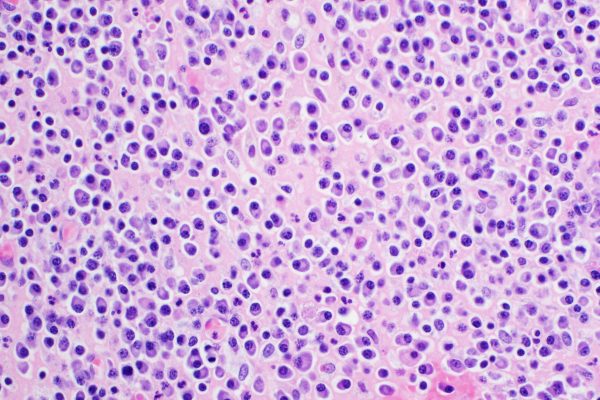
Based on the encouraging results of the MagnetisMM-3 trial, the FDA has granted accelerated approval to ELREXFIO™ (elranatamab-bcmm) for the treatment of adult patients with relapsed or refractory multiple myeloma (R/R MM) who have received at least four prior lines of therapy, including a proteasome inhibitor, an immunomodulatory agent, and an anti-CD38 monoclonal antibody. The approval was recently announced by Pfizer, and a portion of the findings has already been published in the prestigious journal Nature.
The introduction of immunomodulatory drugs, proteasome inhibitors and anti-CD38 monoclonal antibodies has transformed the treatment landscape in multiple myeloma (MM). However, patients with progressive disease after these treatments face poor outcomes. B-cell maturation antigen (BCMA), a member of the tumour necrosis factor receptor superfamily, is highly expressed in malignant plasma cells, making it an ideal target for the treatment of multiple myeloma. Elranatamab is a humanised bispecific antibody that targets both BCMA (on myeloma cells) and CD3 (on T cells), directing T cells to induce a cytotoxic T-cell response against myeloma cells. Based on the promising results of the phase 2 MagnetisMM-3 trial, the FDA has granted accelerated approval to ELREXFIO™ (elranatamab-bcmm) for the treatment of adult patients with relapsed or refractory MM (R/R MM) who have received at least four prior lines of therapy, including a proteasome inhibitor, an immunomodulatory agent, and an anti-CD38 monoclonal antibody.1
The phase 2 MagnetisMM-3 trial evaluated the efficacy and safety of elranatamab monotherapy in patients with R/R MM. Patients had to have a disease that was refractory to at least one proteasome inhibitor, one immunomodulatory drug and one anti-CD38 antibody, and had to be relapsed or refractory to their last antimyeloma regimen. Patients eligible for cohort A could not have received prior BCMA-directed therapy (n=123), while patients eligible for Cohort B must have received a prior BCMA-directed antibody-drug conjugate or BCMA-directed CAR T-cell therapy (n=64). All patients received subcutaneous elranatamab 76 mg QW on a 28-day cycle with a two-step-up priming dose regimen of 12 mg on day 1 and 32 mg on day 4 during the first week. The primary endpoint was the overall response rate (ORR), defined as partial response or better according to IMWG criteria.
After a median follow-up of 14.7 months, 61.0% of patients had a confirmed objective response in cohort A (n=123). A complete response or better was achieved in 35.0% of patients, and a very good partial response or better was achieved in 56.1%. The median time to first response was 1.2 months, and responses deepened over time. Median duration of response, progression-free survival and overall survival have not been reached. Fifteen-month rates were 71.5%, 50.9% and 56.7%, respectively. For the responding patients, the probability of maintaining a response at 15 months was 72%.1 Among responding patients who switched to every-other-week dosing at least six months prior to the data cut-off date (n=50), 80% maintained or improved their response after the switch, with 38% attaining a complete response or better after the switch. Among the 63 patients in cohort B who received at least four prior lines of therapy, including a BCMA-directed therapy, the ORR was 33% after a median follow-up of 10.2 months, with an estimated 84% maintaining the response for at least nine months.2 Common adverse events included infections, cytokine release syndrome, anaemia, and neutropenia. With biweekly dosing, grade 3-4 adverse events decreased from 58.6% to 46.6%.1,2
In conclusion, elranatamab has demonstrated the ability to induce deep and durable responses while maintaining a manageable safety profile. The option to switch to biweekly dosing may offer the potential for improved long-term safety without losing effectiveness. Furthermore, it’s noteworthy that elranatamab represents the first off-the-shelf fixed-dose subcutaneous BCMA-directed agent in the U.S., offering the possibility of every other week long-term dosing after 24 weeks of weekly treatment.1,2
References